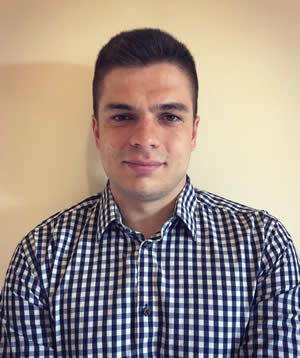Interview with Márk Magasházi (mechanical engineer)
“Students here can gain applicable high-level knowledge.”
Interview with Márk Magasházi, mechanical engineer who was one of our dual students (G-Software and Services Ltd.)
(Part 6 of the Alumni Interview Series)

- What was your motivation for choosing our university or its predecessor institutions?
After graduation, during my technician year, I thought a lot about my future. How could I get my degree and gain several years of experience at the same time. I also considered other sources of income besides student grants. This question was answered by a poster displayed in the high school. Dual training. When I saw that in 2016, mechanical engineering was a first degree course at the university, I hesitated no more. Leaving my previous ideas behind, I knew immediately that I would apply for a full-time dual course at ÓE AMK. - Exactly which predecessor institution did you study at? Which degree(s) did you obtain?
I graduated in 2020 from Alba Regia Faculty of Technology of Óbuda University with excellent result specialising in mechanical engineering. - Can you recall your first memory of university?
My first memory is from the week of registration. I don’t remember exactly, maybe on the third or fourth day we went to a briefing in the big lecture hall. After being told all the necessary information, to everyone’s surprise, we had to take a maths and physics test. Most people didn’t even have pens, after all we didn’t really have good results. As it turned out, it was just a level assessment on the need for extra consultation/catch-up. - Did the institution give you a life-long passport?
During my university years, in addition to the knowledge provided by my compulsory studies, I acquired a number of qualities that I could benefit from in my career. Problem solving, teamwork, self-reliance, etc. These are just a few of the most important skills that are essential in today’s environment. This experience is the result of the dual training and the harmonious cooperation between the institution and the partner company. - Did you find time to have fun while you were studying? What were your student years like at university?
As I was a dual student, I had to find a good balance between studying, working and having fun. In many cases I had to make decisions that meant giving up one of the three. In most cases, I clearly put fun on the back burner so as not to compromise my studies and work. This showed a high degree of self-discipline, which in hindsight I have absolutely no regrets about. - Can you describe what you loved most about the university?
For me, the most defining characteristic of the university is its humanity. Being a smaller faculty, our teachers put a lot of emphasis on supporting students. It was easy to arrange extra consultations if someone had something to catch up on. - What opportunities do you see in higher education today?
I follow the university news constantly and I am pleased to see that companies in the region are making substantial contributions to the development of the faculty. This is certainly important for the industry in order to attract skilled technical people with the most appropriate qualifications into the labour market. I believe that most experience can be gained in a real-life environment, but with the continuous development of the university’s laboratory, students may have access to significant knowledge within the walls of the building. - Any advice for today’s youth on how to choose a university/career for themselves?
The energy invested in work and study will pay off sooner or later. Goal is important, it is essential to set some goalsddd/objectives for which you will not spare the right amount of energy. - To what extent can you use what you have learned at our institution in your workplace?
I have had a number of key subjects that have had an impact on my work. To give you an example, automation and robotisation have now become an essential element of industry. - Did you want to do this as a child or did you have other “career dreams”?
From a young age, I had the idea that one day I would work in the engineering world. Over the years, this has been reinforced and as I’ve got to know more and more aspects of the profession, I’ve become more aware of what I really want to do. - Did you have a supporter who helped you at the beginning of your career?
First of all, my parents and close relatives, who constantly gave me advice and motivation when I needed it. I received a lot of help from my colleagues and superiors during my student days, my traineeship and then my full-time job. They have had/are having a great impact on my professional career. - Why would you recommend the Alba Regia Faculty of Óbuda University to young people?
I recommend it because it is located in one of the largest industrial areas of Hungary. It has links with companies operating in the region, which gives students the opportunity to build their careers. As a result of these connections, it has state-of-the-art equipment that is fully adapted to modern production conditions. Students studying here can acquire a high level of applicable knowledge. The university staff are professionally trained and fully support students in achieving their goals and success.
